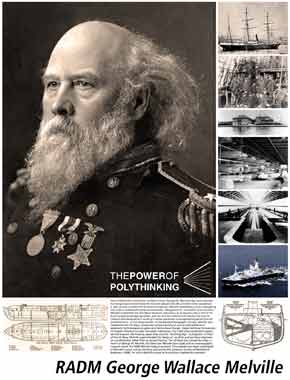
One of Polytechnic University's earliest alums, George Wallace Melville (1841-1912) received the Congressional Gold Medal for heroism aboard the USS Jenrette's legendary Arctic expedition. A 19th century wunderkind mechanical engineer, Melville immediately set to redesigning ship hulls to withstand hostile environments. Recognized for innovation and invention, Melville established the Navy's first Research Laboratory at Annapolis with a first-of-its-kind Congressional appropriation, and can thus be credited with paving the way for research and development funding in areas previously unrecognized by governmental establishments. A founding member of the National Geographic Society, Melville was responsible for the Navy's propulsion systems during an era of remarkable force expansion, technological progress and institutional change. Major technical innovations he helped introduce include: the water-tube boiler, the triple-screw propulsion system, vertical engines, the floating repair ship, and the "distilling ship." As Engineer in Chief of the US Navy, Melville superintended the design of 120 ships and put Navy engineers on a professional rather than an artisan footing. The US Navy has named two ships in honor of George W. Melville, the Destroyer Melville (1915-1948), and an oceanographic research vessel, the USNS Melville (1969 to present). Two awards have been established in Melville's name, one by the Navy and one by the American Society of Mechanical Engineers, ASME, for which Melville served as the society's eighteenth president.